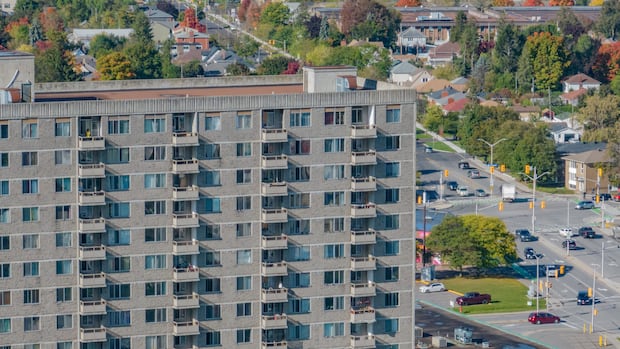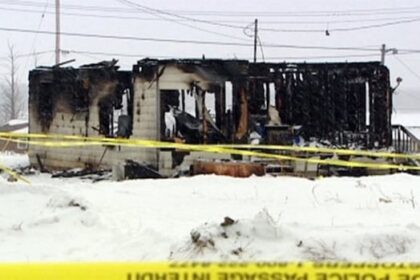Ottawa·NewA new bill tabled by the provincial government is poised to change tenants’ rights at the Landlord and Tenant Board, which some fear could have rippling consequences in Ottawa.Councillor worried province’s proposed changes could worsen homelessnessGabrielle Huston · CBC News · Posted: Oct 27, 2025 10:43 AM EDT | Last Updated: 40 minutes agoListen to this articleEstimated 4 minutesThe minister of municipal affairs and housing has walked back a controversial element of Bill 60, but concerns remain about some of the other changes the bill would introduce. (Michel Aspirot/CBC/Radio-Canada)A new bill tabled by the provincial government is poised to change tenants’ rights at the Landlord and Tenant Board (LTB), which some fear could have rippling consequences in Ottawa.Bill 60, dubbed the Fighting Delays, Building Faster Act, 2025, was tabled last week. It includes numerous changes, but the ones pertaining to renters largely apply to cases at the LTB in an attempt to reduce its long-standing backlog.One proposal was particularly controversial: that the government begin consulting on ways to “allow landlords to control who occupies their units and for how long,” according to the technical brief. Advocates, including Ottawa lawyer and tenants’ rights expert Daniel Tucker-Simmons, have warned that could open the door to ending rent control and indefinite leases.”It’s completely unhinged, to be honest,” Tucker-Simmons told CBC on Sunday morning.That same afternoon, Minister of Municipal Affairs and Housing Rob Flack posted online that those consultations are “not proceeding.”Speaking to CBC after Flack’s statement, Tucker-Simmons said he was “delighted, initially,” but added there are “still a number of concerning legislative changes [in Bill 60] at a very questionable moment in history where the residential tenancies market is very tight.”‘Residents expect stability and predictability in Ontario’s rental market, and now is not the time to consider changes,’ wrote Minister Rob Flack online, referring to the proposed consultation. (The Canadian Press)What would change? The ministry’s technical brief lists a dozen proposed “initiatives” to reduce delays at the LTB.One change would allow landlords not to compensate tenants who are being evicted, as long as the landlord provides 120 days’ notice. Another would shorten the length of time within which a review of an LTB decision or final order can be requested, from 30 days to 15.John Dickie, chair of the Eastern Ontario Landlord Organization, said changes like these will be good for both landlords and tenants. “I’m certainly told by various landlords … that they are fed up with the delays … they are fed up with the rules and how much they favour tenants,” Dickie said. That’s why a quicker, more efficient system for handling landlord-tenant disputes would enourage more units to come on the market and force tenants who “misbehave” to “clean up their behaviour,” according to Dickie.’When housing overall becomes more flexible, more available, then the pressure is taken off rents and all rents tend to move down a little bit, and it works its way through the whole of the rental market,’ said John Dickie of the Eastern Ontario Landlord Organization. (Kate Porter/CBC)Tucker-Simmons sees it in a different light.”Effectively, what they’re doing is they’re facilitating evictions in Ontario,” the Ottawa lawyer said. “I think they have it completely backwards.” Most of the applications at the LTB are eviction applications due to unpaid rent, which is a result of the ongoing cost-of-living crisis, he argued.”People are unable to pay their rent, and this government’s solution is to make it easier for landlords to evict them. It doesn’t make any sense,” he said, adding that it’s the government’s responsibility to address the root cause.’If people aren’t paying their rent, it’s because they can’t afford it. They’re not gaming the system,’ said Daniel Tucker-Simmons, seen here in February 2020. (CBC)Low vacany, high rents in OttawaWith the possibility of more evictions, Stittsville Coun. Glen Gower said he’s worried about Ottawa’s renters and the consequences for the city.Around 36 per cent of Ottawa households rent, expected to jump to 43 per cent by 2035, according to the city.”We are already seeing the lack of tenant protection as as a factor in contributing to homelessness,” Gower said.”We have a very, very low vacancy rate in Ottawa and very high asking rents, and reducing the already meagre protections there are on tenants. It’s just going entirely the wrong way.”‘I think there are a lot of tenants all over the city who are really concerned about this,’ said Coun. Glen Gower said. ‘I would encourage them to contact their MPP, contact Premier Ford and contact their councillors as well.’ (Michel Aspirot/CBC/Radio-Canada)Dickie noted other factors contributing to the homelessness crisis in Ottawa, including an influx of refugees seeking low-income housing.”The governments have woken up to the problem,” Dickie said, citing Ottawa’s recently approved housing acceleration plan. He added that the market is no longer as tight thanks to increasing vacancy rates. Bill 60’s changes could actually make a “minor improvement” by adding rental units to the market, he argued.But Tucker-Simmons agreed with Gower that the changes could push more people into homelessness.”People are stretched very, very thin, and there’s huge amount of renters that are hovering … just above homelessness,” he said. “And I think that it’s not going to take much to push them over the edge.”ABOUT THE AUTHORGabrielle is an Ottawa-based journalist with eclectic interests. She’s spoken to video game developers, city councillors, neuroscientists and small business owners alike. Reach out to her for any reason at gabrielle.huston@cbc.ca.Follow Gabrielle on BlueskyFollow Gabrielle on Instagram
Wednesday, 4 Feb 2026
Canada – The Illusion
Search
Have an existing account?
Sign In
© 2022 Foxiz News Network. Ruby Design Company. All Rights Reserved.
You May also Like
- More News:
- history
- Standing Bear Network
- John Gonzalez
- ᐊᔭᐦᑊ ayahp — It happened
- Creation
- Beneath the Water
- Olympic gold medal
- Jim Thorpe
- type O blood
- the bringer of life
- Raven
- Wás’agi
- NoiseCat
- 'Sugarcane'
- The rivers still sing
- ᑲᓂᐸᐏᐟ ᒪᐢᑿ
- ᐅᑳᐤ okâw — We remember
- ᐊᓂᓈᐯᐃᐧᐣ aninâpêwin — Truth
- This is what it means to be human.
- Nokoma











